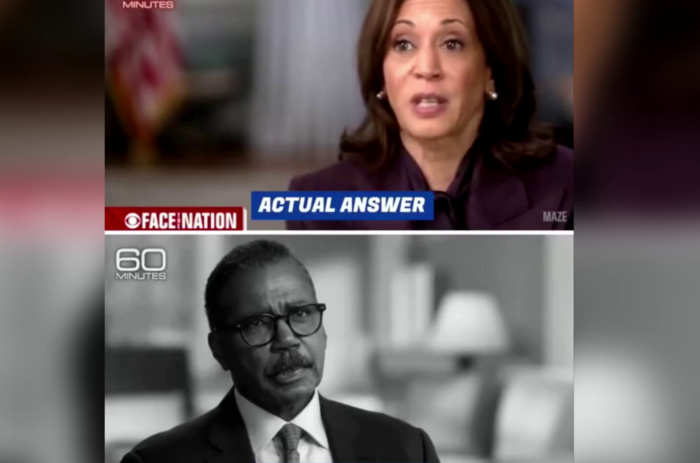redo Jump to...
print Print...
Directions
-Read the excerpt below from Lee Habeeb's commentary.
-Read "Types of Media Bias" in the right column. Then answer the questions.
 When Woodward and Bernstein did their groundbreaking reporting in the 1970s, they uncovered abuse of power and corruption that led to the resignation of the nation’s highest elected official. It was what a free press can and should do: keep government honest.
When Woodward and Bernstein did their groundbreaking reporting in the 1970s, they uncovered abuse of power and corruption that led to the resignation of the nation’s highest elected official. It was what a free press can and should do: keep government honest.
But Watergate was ultimately a story about one man and one administration. The VA [Veterans Affairs] story is about something much larger: systemic corruption at one of our biggest federal agencies. The Department of Veterans Affairs [VA] employs more than 300,000 people and has an annual budget that’s increased from $98 billion in 2009 to more than $153 billion today. Of those 300,000-plus workers, a stunningly low number are primary-care doctors – 5,100. And though the VA’s budget has increased almost 60 percent in the past three years to keep up with an increase of almost 50 percent in patients, the number of VA doctors has increased by only 9 percent.
Small wonder that there are long waits; bureaucrats and administrators don’t treat patients.
That’s why this story is so much bigger than one man’s fall by way of Watergate. This story is not about what departed VA secretary General Eric Shinseki knew and when he knew it, or about what President Obama knew — or should have known. It’s about federal bureaucracies and how they too often serve themselves instead of their customers.
No one person can be blamed for what is happening at the VA, because no one person caused the problem. No one person can fix it. General Patton himself, who wore down the Nazis and their menacing panzer divisions, would have been beaten down by the immense VA bureaucracy.
The man who runs the world-renowned Cleveland Clinic, Delos “Toby” Cosgrove, turned down an offer from President Obama to run the VA, citing his commitment to his current job. We all know the real reason he said no.
As President Obama’s chief adviser David Axelrod admitted in a rare moment of candor, the federal government is so sprawling that it’s almost impossible for anyone – even our chief executive officer – to keep track of it. In the early days of the IRS scandal, Axelrod told MSNBC: “Part of being president is there’s so much beneath you that you can’t know because the government is so vast.” Forget too big to fail. The VA and most other federal agencies are too big to manage. And they’re certainly too big to change.
 If an army of Woodwards and Bernsteins were unleashed on the VA, can you imagine what they might find? If 1,000 FBI agents used state-of-the-art forensics and software to ferret out corrupt practices, can you imagine what they might unearth?
If an army of Woodwards and Bernsteins were unleashed on the VA, can you imagine what they might find? If 1,000 FBI agents used state-of-the-art forensics and software to ferret out corrupt practices, can you imagine what they might unearth?
Already, the inspector general’s report has revealed that those waiting lists and wait times in that one Arizona VA hospital were not the exception but the norm. We now know that those secret waiting lists were not the work of only one or two bad managers; they were at the heart of a system that incentivized such corruption. Worst of all, we learned that whistleblowers were afraid to expose such practices for fear of reprisal from their bosses.
According to the New York Times, Representative Jeff Miller (R., Fla.), chairman of the House Veterans Affairs Committee, said that whistleblowers at several veterans’ hospitals had told his staff members that they would be threatened if they failed to alter data to make patient-access numbers look good for their supervisors. Miller has rightfully called for a criminal investigation.
“Fear was instilled in lower-level employees by their superiors, and those superiors did not want long wait times,” Mr. Miller said. “Bonuses are tied directly to the waiting times of the veterans, and anybody that showed long wait times was less likely to receive a favorable review.”
To some Americans, the VA scandal, though outrageous, stands as an outlier. To those of us who worry about what can happen when unelected bureaucrats have no check on their power, the VA horror is predictable. We know that it represents only the tip of the federal-agency iceberg.
Can you imagine what a team of hardworking (or even halfway diligent) journalists might uncover if they spent a lot of time investigating the VA, or HUD, or the waste and fraud in Medicare, or the abuse in our skyrocketing disability programs, or the scams and fraud in food stamps?
Regrettably, there is less journalism being practiced in our country than ever before, at a time when we need it most. Indeed, many of our journalists are clearly doing the public-relations work of the executive branch of our government. …
Great journalism would undoubtedly expose a universe of dysfunction in many of our federal agencies, and the ugly picture would permanently alter how Americans view their government. We’d be motivated at last to make an all-out effort to find practical solutions, derived from experience in the private sector.
For an example of how the private sector leaves government in the dust, look at FedEx or UPS, which can track a package in real time, in flight, and get that package anywhere in this country, affordably and within 24 hours. And a veteran can’t get in to see a doctor in weeks or even months? The VA’s inefficiency is an outrage, but it’s also the obvious outcome when the customers can’t walk and the employees know they’ll keep their jobs no matter how poor their work. In the private sector, …competition keeps business honest. FedEx and UPS are behemoths [enormous], but they got big precisely because they were so good at delivering packages on time.
Big-government bureaucracies are petri dishes of corruption. And only a robust fourth estate [journalists] can unearth the true depths of corruption and inefficiency that plague them.
Hal Scherz, a doctor from Georgia, wrote a piece in the Wall Street Journal recently about the VA medical system. Many of our nation’s private-practice doctors, he notes, have worked as medical residents and interns in VA hospitals because most of the 153 VA hospitals are affiliated with the country’s 155 medical schools. Scherz cited story after story from friends who had had terrible experiences while working at the VA. He concludes:
The VA health-care system is a disaster. Throwing more money at the system, or demanding the scalps of top bureaucrats — Washington’s reflexive response to any problem of this sort — won’t repair the mess. What’s needed is a fundamental rethinking of how to provide medical care for America’s veterans. . . . The VA health-care system is run by a centrally controlled federal bureaucracy. Ultimately, that is the source of the poor care veterans receive.
Thomas Lifson at the American Thinker blog seconds Scherz’s conclusion:
It is important that Americans understand the fundamental point about the incompatibility of monopolistic medical bureaucracies and high-quality medical care. It is not a matter of incompetent management and employees (though such no doubt exist). The problem will not be solved by adding dedicated leaders and staff; they also no doubt exist in the VA health-care system. People who can’t be fired and who know that no matter what they do, their organization will continue to exist inevitably become self-serving. This is the moral hazard of government-funded bureaucracies.
That’s the real crux of the VA crisis. That’s the story that’s not really being told, because we don’t have the storytellers – the journalists – who are interested in telling it. Nor do we have the storytelling platforms to frame and distribute it.
If NPR gave that a shot, it would make a heck of a ten-week series, don’t you think?
— Lee Habeeb is the vice president of content at Salem Radio Network.
from nationalreview.com
To accurately identify different types of bias, you should be aware of the issues of the day, and the liberal and conservative perspectives on each issue.
Types of Media Bias:Questions
1. What types of bias is Lee Habeeb illustrating in his analysis of the scandal at the U.S. Department of Veterans Affairs [VA] medical facilities?
2. Mr. Habeeb makes the following assertions about the media:
- A free press can and should keep government honest
- The VA story is about systemic corruption at one of our biggest federal agencies. This story is not about what departed VA secretary General Eric Shinseki knew and when he knew it, or about what President Obama knew – or should have known. It’s about federal bureaucracies and how they too often serve themselves instead of their customers. Where are the journalists covering it?
- To some Americans, the VA scandal, though outrageous, stands as an outlier. To those of us who worry about what can happen when unelected bureaucrats have no check on their power, the VA horror is predictable. We know that it represents only the tip of the federal-agency iceberg. Can you imagine what a team of hardworking (or even halfway diligent) journalists might uncover if they spent a lot of time investigating the VA, or HUD, or the waste and fraud in Medicare, or the abuse in our skyrocketing disability programs, or the scams and fraud in food stamps?
- Thomas Lifson at the American Thinker blog writes, “the problem will not be solved by adding dedicated leaders and staff; they also no doubt exist in the VA health-care system. People who can’t be fired and who know that no matter what they do, their organization will continue to exist inevitably become self-serving. This is the moral hazard of government-funded bureaucracies.” That’s the real crux of the VA crisis. That’s the story that’s not really being told, because we don’t have the storytellers – the journalists – who are interested in telling it. If NPR gave that a shot, it would make a heck of a ten-week series, don’t you think?
What step(s) do you think Americans should take to encourage the media to do its job?
Scroll down to the bottom of the page for the answers.
Answers
1. In his analysis of the scandal at the U.S. Department of Veterans Affairs medical facilities, Mr. Habeeb is illustrating bias by story selection and omission.
2. Opinion question. Answers vary. One possible answer: email the editors of several major media outlets and ask that they initiate investigative reports on government corruption, fraud, waste and mistreatment of the Americans various government agencies serve.



